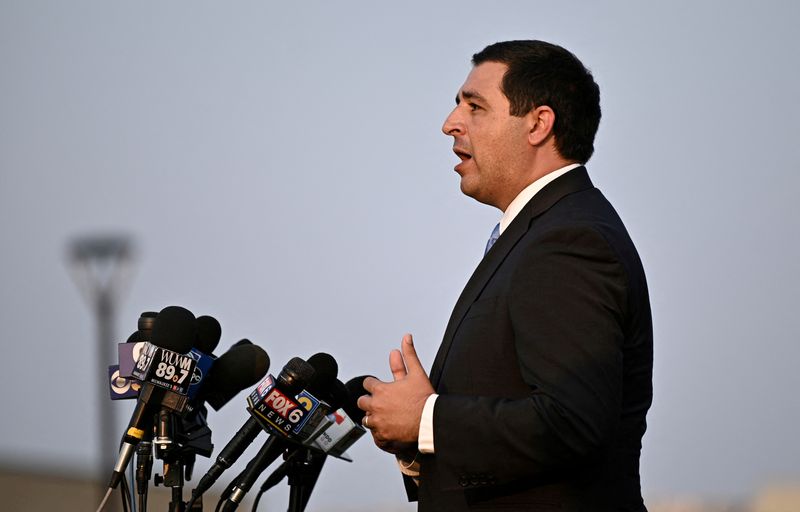By Joseph Ax
(Reuters) - Abortion is now front and center in November's key governor's races in Pennsylvania and Michigan, after the U.S. Supreme Court overturned the landmark Roe v. Wade decision that had recognized a constitutional right to abortion.
Kansas residents, meanwhile, will vote on whether to protect abortion rights in an August ballot measure, now that Roe has been reversed. And abortion will play a consequential role in other gubernatorial and state legislative races around the country, with Democrats aiming to leverage anger over the issue ahead of the Nov. 8 midterm elections.
The Supreme Court ruling overturning Roe handed the power of legalizing or banning abortion to the states, setting the stage for a patchwork of policies across the nation, with many Republican-controlled states expected to outlaw it. Democrats hold too small a majority in Congress to pass national legislation, leaving state legislatures and governors the critical actors.
Senior Democrats hope the decision will motivate their supporters in November and win over swing voters, but economic issues and high inflation are also expected to remain top concerns among voters.
"The 2022 elections are going to send a crystal clear message to elected officials across the country," said Wisconsin's Democratic attorney general, Josh Kaul, on a conference call with journalists on Saturday. "We have it within our power to send a very powerful message, a message that we will not accept politicians taking rights away from Americans."
In Pennsylvania, Republican gubernatorial nominee Doug Mastriano, a state senator, previously sponsored a "heartbeat" bill that would ban abortions after around six weeks, before most women know they are pregnant. He has expressed support for a total ban without exceptions, including for the life of the mother, and referred to abortion as "genocide."
With Republicans in control of the state legislature, a Mastriano victory this fall would likely prompt lawmakers to pass new abortion restrictions.
The Democratic candidate, Attorney General Josh Shapiro, has vowed to protect abortion rights if elected.
"Our Republican legislature will send a bill to our next governor's desk to ban abortion in Pennsylvania," he said on Twitter (NYSE:TWTR) after Friday's ruling. "Without Roe, the only thing stopping them is the veto pen of our next governor."
1931 LAW
In Michigan, Democratic Governor Gretchen Whitmer and Planned Parenthood both have filed lawsuits seeking to block a 1931 law that bans abortions from retaking effect in the event that the Supreme Court overturned Roe.
A state court judge in May temporarily put the 91-year-old law on hold while the litigation proceeds.
Whitmer is running for reelection this fall. The top Republican candidates, who will face off in an Aug. 2 primary, all oppose abortion rights, and the state legislature's two chambers are both controlled by Republicans.
"I will fight like hell to protect every Michigander's right to make decisions about their own body with the advice of a medical professional they trust," Whitmer said in a statement on Friday.
Michigan abortion rights advocates are seeking to put a ballot measure before voters in November that would enshrine a right to abortion in the state constitution.
In Kansas, the state Supreme Court ruled in 2019 that abortion is protected under the state constitution. But voters on Aug. 2 will decide whether to approve an amendment stripping abortion rights from the constitution, opening the door for the Republican-controlled legislature to pass new limits.
Democratic Kansas Governor Laura Kelly, who supports abortion rights, is running for re-election. Republicans currently hold a legislative super-majority, enough to override any gubernatorial veto.
In some other battleground states, Democratic gubernatorial candidates who support abortion rights have few options in the face of pre-existing laws and Republican-controlled legislatures.
In Wisconsin, Friday's decision reinstated an 1849 state law banning all abortions except to save the life of the mother, though litigation challenging the statute is expected.
Governor Tony Evers, a Democrat, called lawmakers into a special session this month to repeal the law, but Republicans adjourned the session without taking action. Evers is also running for reelection in November.

In Georgia, a "heartbeat" bill appears likely to take effect following the Supreme Court decision. Democrat Stacey Abrams, who is challenging Republican Governor Brian Kemp in November, supports abortion rights but would have little recourse with a Republican-dominated legislature.
Some Republican lawmakers in Georgia have advocated for a full abortion ban; Kemp, who praised Friday's ruling, has not said whether he would support such a step.